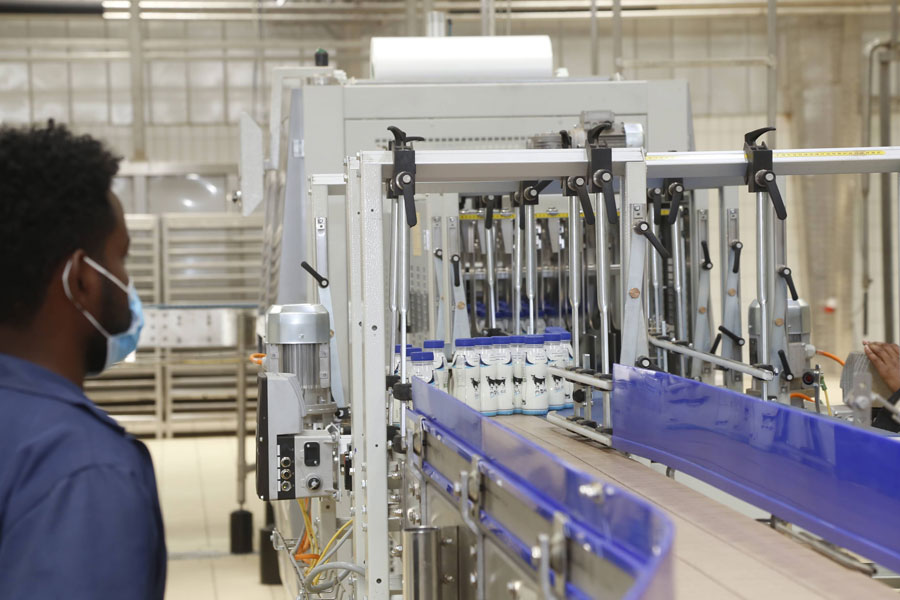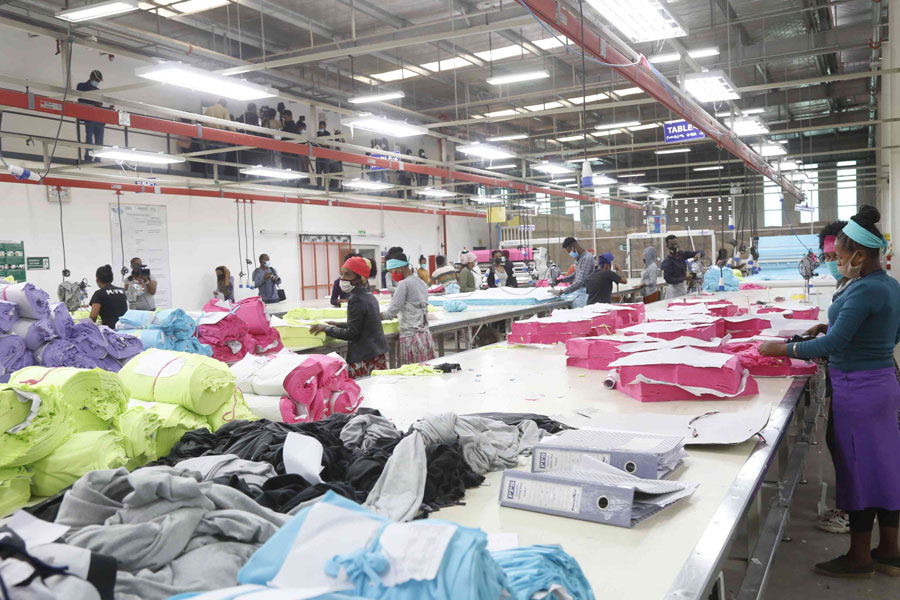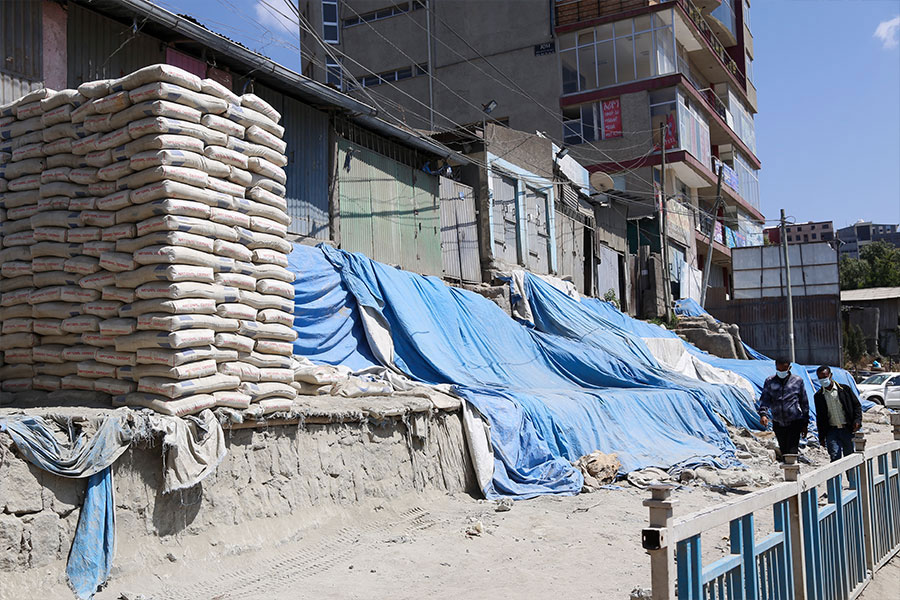
Editorial | Aug 20,2022
For the past couple of weeks, employees of SW Poultry Farm have added an additional activity to their daily routine of breeding chickens and selling them to farm owners who grow them for meat or egg production.
They put day-old chicks in a sack and tie it off to cut off their supply of oxygen. After the chicks have suffocated, they bury them. The employees find this very depressing.
The employees are faced with this grim task, because nobody has been buying chicken for the last several weeks following the spread of Novel Coronavirus (COVID-19). The farm is bitterly affected by the situation.
Located in Dera town of Arsi, Oromia Regional State, the farm was established in 2011 and hatches and sells 700,000 to one million chickens a year and 20,000 weekly.
FW Agro Production Processing, SW Farm’s sister company, used to source 5,000 chickens from the farm and supplied the chickens to its primary consumers, which include hotels, restaurants and catering service providers.
After COVID-19 was reported in Ethiopia in the middle of last month, the hotel business has fallen off sharply. Thus, the hotels are not buying chicken meat from suppliers like SW Farm.
“Currently, there's no demand for poultry products, because there are no meetings, fiestas, parties or receptions, and hotels and restaurants are shut down, because of the virus," Samson Wossen, owner and general manager of SW Poultry Farm, which employs 60 workers. The business is disposing of 12,000 to 15,000 chickens a week at the moment.
“We can’t operate at this time, because 70pc of the total demand for our chicken products comes from hotels and restaurants, and the remaining 30pc comes from households,” said Samson.
Samson's business is in dire straits, because hospitality services such as hotels and restaurants are closed, but there are other disruptions in the supply chain that are contributing to the problem as well.
Addis Chicken, founded in 2017, runs a slaughterhouse and processing plant in Goro area. Due to the absence of demand for chicken, the company has been severely reducing its production .
“Our company is at a dead-end due to the disruption the virus inflicted on the sector,” said Azeb Wossen, managing director of Addis Chicken, which supplies chicken products to hotels, restaurants, supermarkets and directly to consumers via its outlet located in Bole.
Employees of Yo Farm dispose of day-old chicks by burying them in a hole.
The company has been supplying its products to hotels such as Sheraton, and other companies like Queens, a supermarket chain owned by Midroc. The company was also in negotiations with Ethiopian Airlines, an agreement that was never finalised.
"But now we're selling only to some supermarkets at a low price,” said Azeb.
The company, supplied by its sister companies, SW Poultry and FW Agro Production Processing, sells three categories of chicken products: ready-to-eat, ready-to-cook, and raw chicken.
Another business that has been hit by the dire situation is Ethio Chicken, which was established in 2010, and is one of the 50 large-scale commercial poultry farms in the country. It hatches 550,000 to 800,000 breeder chicks weekly.
Ethio Chicken and its partners - AGP Poultry, Mekelle Farms and Andasa Poultry Plc, as well as eight poultry breeder farms and two feed mill production plants - produce and sell improved breeds of chickens to households and commercial farmers.
Its sales have fallen by 70pc, and now it is selling less than 100,000 breeder chickens a week, according to Fseha Tesfu (PhD), sales and marketing director at Ethio Chicken, which currently employs 1,450 people.
Over the past three weeks, the company disposed of 666,501 chicks because of the fall in demand.
"We can’t feed the chicks without an income,” said Fseha. “About 7,200 self-employed people are breeding and distributing our chickens in the value chain, who are losing their livelihood.”
The farm, whose plan was to hatch 30 million chicks by the end of 2020, has not stopped production.
“We haven’t yet stopped hatching chicks,” says Fseha, “because we hope that the pandemic will soon be controlled. If we stop production, it'll be difficult to start again.”
On top of killing the chickens, Yo Farm, which was established in 2013, is slaughtering its breeder chickens and storing the meat because of the market disruption caused by the epidemic.
Yo Farm, which employs 30 people, has prepared 45 container fridges to store chicken meat. The farm that used to hatch 20,000 chicks a week has destroyed 24,000 chickens and slaughtered 2,000 chickens in the last two weeks.
“We're incurring a loss of more than a million Br a week," said Robel Ephrem, manager at Yo Farm.
While most of the companies are disposing of the chickens, a few are still feeding the chickens in the hope that things will get back to normal soon.
Elere Farm, located in Bishoftu, which was established in 2008, is currently spending 60,000 Br weekly to feed the chickens and pay salaries to its 42 employees.
The Farm has been hatching 15,000 chicks a week. It also used to import hybrid chicks at a total cost of seven euros a chicken, according to him.
“We aren't selling our chicks and are incurring a loss of half a million Birr weekly,” said Fanta Terefe, owner of Elere Farm and vice-president at the Ethiopian Poultry Producers & Processors Association. “We're waiting for the government to subsidise the sector."
Amidst this disruption, the Association wrote a letter to the Ministry of Agriculture, Ethiopian Meat & Dairy Industry Development Institute, Development Bank of Ethiopia and the Ministry of Trade & Industry detailing the lousy situation the sector is currently facing.
The Association is also engaging with stakeholders to deal with the problem, according to Misgina Fitsumbirhan (PhD), general manager of the Association.
“The effect is not only on the economy but also on daily life, since a poultry farm employs an average of 800 to 1,000 people, and these people are losing their jobs,” said Misgina, who urges the government to intervene to rescue the industry.
The effect on the poultry farms is severe, because most of them have debt from the Development Bank of Ethiopia (DBE), according to him.
The government is not standing idly by, according to Sahlu Mulu (PhD), livestock sector adviser at the Ministry of Agriculture, adding that his Ministry has assessed the problems and prepared a contingency plan.
“We've already devised mitigation strategies to deal with the problem of the livestock sector in general,” said Sahlu.
The technical and financial mitigation strategies will be implemented as soon as possible to sustain the cold chain facilities and give logistical and financial assistance to reduce the severe effects of the pandemic on the sector, according to Sahlu.
The COVID-19 pandemic broke the supply chain of the poultry sector and made it difficult for the industry to supply to farmers, according to Demeke Wendimagegn (PhD), director of poultry sector at Ethiopia-Netherlands Trade for Agricultural Growth.
He argues that there are chicks in the hands of distributors that are not yet sold to farmers, and the distributors cannot demand new chickens. The transportation ban contributes to the drop in supply and the absence of inputs for the industry, according to him.
"There'll be a supply gap and chicken product scarcity in the next five to six months if the conditions of the poultry sector continue like this," Demeke said. “The industry isn't like others and needs special attention from stakeholders."
Throughout the country, there are 2,500 to 3,000 medium and small-scale commercial poultry farms that produce 1.8 billion eggs a year.
Demeke has a number of policies he thinks might help the sector: the government should have logistical facilities, buy the chickens and store them in refrigerators, give revolving funds to sustain the farms and assure the continuation of the sector’s food and marketing value chain. The Development Bank has to incentivize the industry by injecting cash and extending debts, he added.
“The government has to store the poultry meat to cope with the post-pandemic food scarcity situation," he said. "The government should also promote the sector, because it benefits the economy and those it employs."
UPDATE: We initially reported that Addis Chicken "... used to provide 2,000 chickens to Ethiopian Airlines daily." That is an error. Though Addis Chicken had hoped to negotiate a deal with Ethiopian Airlines, they never started supplying them. We deeply regret the error and sincerely apologise to our esteemed readers for any inconvenience this might have caused.
PUBLISHED ON
Apr 17,2020 [ VOL
21 , NO
1042]

Editorial | Aug 20,2022

Featured | May 08,2021

Fortune News | Jan 13,2024

Radar | Dec 04,2022

Viewpoints | Apr 25,2020

Radar | Jul 24,2021

Fortune News | Mar 19,2022

Fortune News | Jun 08,2019

Fortune News | Jun 25,2022

Radar | Nov 05,2022

Dec 22 , 2024 . By TIZITA SHEWAFERAW
Charged with transforming colossal state-owned enterprises into modern and competitiv...

Aug 18 , 2024 . By AKSAH ITALO
Although predictable Yonas Zerihun's job in the ride-hailing service is not immune to...

Jul 28 , 2024 . By TIZITA SHEWAFERAW
Unhabitual, perhaps too many, Samuel Gebreyohannes, 38, used to occasionally enjoy a couple of beers at breakfast. However, he recently swit...

Jul 13 , 2024 . By AKSAH ITALO
Investors who rely on tractors, trucks, and field vehicles for commuting, transporting commodities, and f...

Oct 25 , 2025
The regulatory machinery is on overdrive. In only two years, no fewer than 35 new pro...

Oct 18 , 2025
The political establishment, notably the ruling party and its top brass, has become p...

Oct 11 , 2025
Ladislas Farago, a roving Associated Press (AP) correspondent, arrived in Ethiopia in...

Oct 4 , 2025
Eyob Tekalegn (PhD) had been in the Governor's chair for only weeks when, on Septembe...